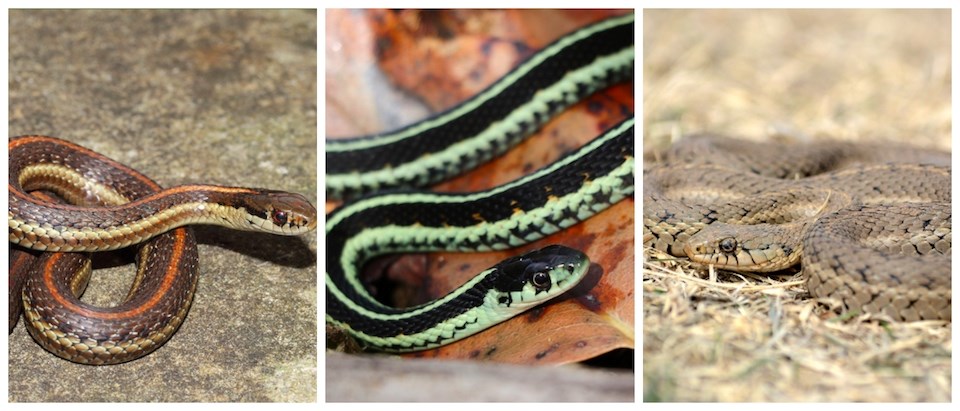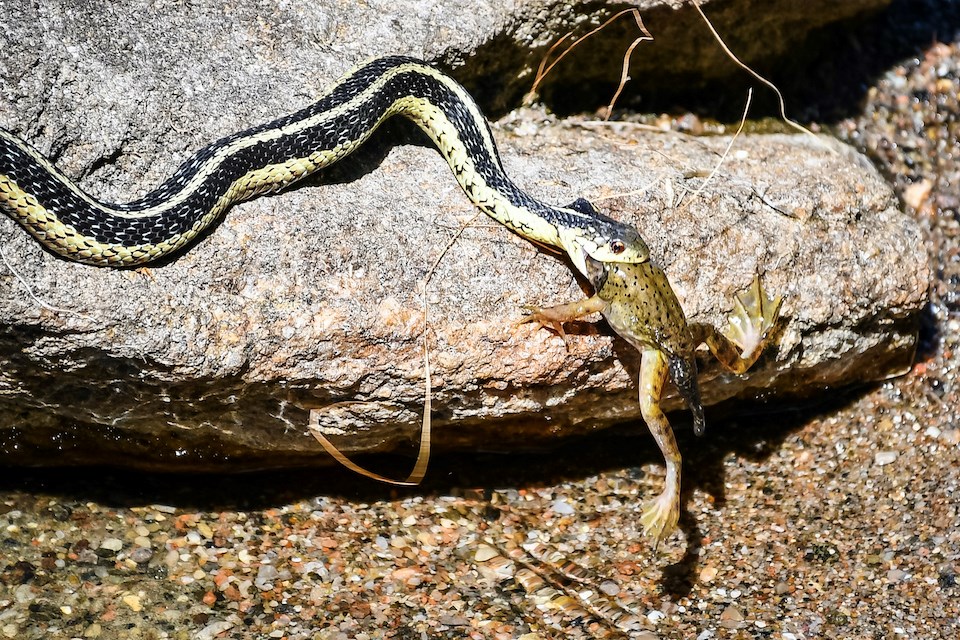They hiss and sneak up on you -- but they aren't felines.
While they might share some defensive characteristics with other animals, snakes hold a decidedly special place in the human psyche.
The subject of everything from folklore to modern supervillains to contemporary design with biomimicry to ancient artwork, these creatures have captivated humans for millennia. Heck, they've even inspired one of actor Samuel L. Jackson's most memorable lines about "snakes on a plane."
But for researcher Leigh Anne Isaac, the legless creatures represent far more than just interesting subjects.
As an integral part of the ecosystem, snakes play a role as predator and prey, keeping populations of pests, including rats and mice, at bay while also serving as food for larger animals.
Issac, who is B.C.'s Small Mammal and Herpetofauna Specialist, says misconceptions about the unique creatures may prevent them from getting the respect and protection that they deserve. Plus, most local species can't hurt you.
If you live in the Lower Mainland, there are only three native snakes you'll encounter -- and they are all of the garter variety (commonly mispronounced as "garden.")
The three different types of garter snakes found across the Lower Mainland include the common garter snake, the northwestern garter snake, and the western terrestrial garter snake.

Garter snakes do not have enough venom to hurt humans, they are not poisonous and they don't constrict around their prey. In other words, their attributes don't include any of the terrifying snake features.
In fact, people pose more of a risk to the skinny critters than they do to us.
Garter snake behaviour
Since they don't pose obvious risks, many people take garter snakes home as pets -- and this is a big no-no. Taking one home is a violation of B.C.'s Wildlife Act, ."
Due to their long spines, people can easily injure them, and, if they do bite and you pull your hand away too quickly, one or more of their teeth could break," Isaac told V.I.A.
"They have a series of defensive behaviours. After hiding, they flee. But if they are cold, they can't move quickly. They might hiss and try to look scarier," she said.
"Garter snakes will also dump contents from their vent to be stinky."
While you may associate the expulsion of an unpleasant stench with skunks, several other critters use stinky tactics to ward off threats. Vultures are known to vomit if they feel afraid, while when they are playing dead (it helps to smell as dead as you look), according to National Geographic.
Of course, garter snakes fear larger creatures, but, like all snakes, they aren't shy when it comes to devouring prey. They will aggressively swallow fish, rodents, slugs, frogs, and other creatures whole and then let the digestive enzymes in their bellies finish the job. The slim snakes can eat much larger prey because of the flexible cartilage in their skulls, explains Issac.
Snakes are ectotherms, meaning that they are cold-blooded animals that absorb radiant heat through ground temperature rather than generating their own body heat. Since they require sunlight to warm the ground, they are more active in warmer months and find places to hide out in the winter.
Snake overwintering sites in Canada
In Metro 91原创, snakes generally don't have to retreat too far into the ground to prevent becoming frozen over the winter. However, snakes in other parts of B.C., such as areas in the north, must travel much deeper. They will go anywhere that can get them below the frost line, including fissures in rocks or dikes.
Snakes often overwinter communally, meaning that several individuals will gather together in one site. In Manitoba, there is an awe-inspiring emergence of the reptiles.
In late April and the first weeks of May, depending on conditions, thousands of snakes slither out from their winter's sleep at the Narcisse Snake Dens in the . The males typically come out first and wait for the females to join them. After this, there is a mass mating affair of red-sided garter snakes, according to the Province of Manitoba.
"It is truly a sight to behold," Issac remarks.
B.C.'s female garters are larger than their male counterparts, thanks to the babies that they carry with them until birth. That's right: unlike many other reptiles, these snakes don't lay eggs.
Since they live in higher latitudes, the longer they hold onto their babies the greater the "chance they have of having them," Isaac explains. "Everything is tied to temperatures."
The B.C. interior is home to a variety of other snake species, including gopher snakes, rubber boas, rattlesnakes, desert nights, and yellow-bellied racers.
The Northwest 91原创 Rattlesnake is the only one with a venomous bite that can harm humans. Disturbingly, it can even bite you when it's dead, and . As a result, you shouldn't handle a rattlesnake, dead or alive.
Snake conservation in B.C. in beyond
No matter where they are located, snakes play an important part in the health of local ecosystems. But they are also a boon for gardeners, who may not want slugs and bugs chowing down on their vegetables.
The biggest threat to the reptiles in B.C. is road mortality. A nice new paved section of the road might be an appealing heat source for snakes, but they often get hit simply by crossing thoroughfares, Issac notes.
If you encounter amphibians and/or reptiles on roads, you should see if the animal is alive, injured, or dead. If it is still alive, you can move it in the direction it was headed out of harm's way. Only do this if it is safe, meaning that other vehicles can see you. Wear high visibility clothing, use your hazards on your car, and only attempt when conditions are safe," says BC Reptiles & Amphibians.
"If you encounter a snake and you are not sure if it is a rattlesnake, always move the snake using a rake, shovel, or a long stick, to avoid being bitten. Wear disposable gloves or wash your hands with soap and water before handling amphibians to move them off the road, as chemicals and oils on our skin can be very harmful to them."
If the animal is injured, carefully place the animal in a secure container with air holes and place it in a dark quiet place. Promptly contact your local .
Do snakes spread disease?
In general, you should only "respectively" observe snakes and not pick them up and never take them home. Also, be careful about off-leash pets, such as cats, that cause harm to several wildlife species.
So far, B.C. researchers haven't noticed the spread of any diseases in local snakes, but there are emerging ones in other parts of the continent, including Snake fungal disease.
If you own a snake and can no longer care for it, do not release it into the wild. Consider re-homing options in your community. Also, note that , including the African rock python, the Burmese python, the Green Anaconda, and several others.
Report roadkill or “hotspot” areas where wildlife seems to be killed frequently鈥痑t .

